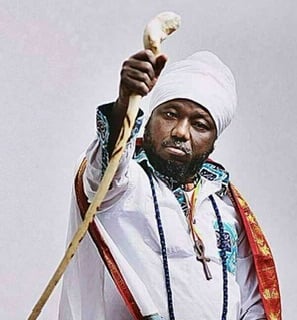Blakk Rasta, a prominent figure in Ghanaian media and music, expressed profound relief and jubilation at the outcome of the recent presidential election, which saw John Dramani Mahama emerge victorious. His elation stemmed from a deep-seated disillusionment with the outgoing New Patriotic Party (NPP) government, a sentiment so strong that he had vowed to leave Ghana permanently if their candidate, Vice President Dr. Mahamudu Bawumia, had won. This wasn’t a mere political statement, but a deeply personal decision rooted in his perception of the NPP’s governance. He believed their policies had led to significant hardships for Ghanaians, and a continuation of their rule, in his view, would have been detrimental to the nation’s well-being. This conviction fueled his decision to explore options for relocating from Ghana, a testament to the depth of his discontent.
In the weeks leading up to the election, Blakk Rasta had actively prepared for a potential departure from Ghana. He traveled extensively, including trips to Jamaica and the United States, to lay the groundwork for a smooth transition should the NPP retain power. This proactive approach underscored the seriousness of his intent. His actions mirrored the stance taken by the renowned Nigerian playwright, Wole Soyinka, who had pledged to destroy his American green card if Donald Trump were re-elected as US President. For Blakk Rasta, this wasn’t simply political grandstanding; it was a tangible demonstration of his commitment to his principles and his belief in the need for change in Ghana. He saw the potential for a continued NPP administration as a scenario he was unwilling to endure, prompting him to take concrete steps to relocate.
Blakk Rasta’s decision to prepare for self-imposed exile reveals a deep sense of frustration and disappointment with the NPP’s performance. He criticized the government’s economic policies, arguing that they had placed an unbearable burden on the Ghanaian populace. In his view, the economic hardships faced by ordinary Ghanaians were a direct consequence of the NPP’s mismanagement and misguided policies. He believed that the NPP’s focus on certain economic strategies had not yielded the promised benefits and instead had exacerbated existing inequalities and hardships. This perspective solidified his conviction that a change in leadership was essential for the country’s recovery and future prosperity.
The radio presenter’s strong reaction to the possibility of an NPP victory underscores the polarization of Ghanaian politics and the passionate engagement of its citizens. His decision to consider leaving the country highlights the high stakes involved in the electoral process and the deep emotional investment individuals have in the outcome. It also reflects the broader societal anxieties and concerns regarding governance, economic stability, and the direction of the nation. Blakk Rasta’s pronouncements, while intensely personal, resonated with a segment of the population who shared similar concerns about the NPP’s leadership.
Mahama’s victory, therefore, represented more than just a change in leadership for Blakk Rasta; it symbolized a renewed hope for Ghana and a chance to address the issues he believed had plagued the nation under the NPP. He viewed Mahama’s return to power as an opportunity to rectify the perceived missteps of the previous administration and to chart a new course for the country. He hoped that the new government would prioritize policies that address the economic challenges faced by ordinary Ghanaians and work towards creating a more equitable and prosperous society. This sense of optimism and anticipation for a brighter future under Mahama’s leadership fueled his relief and joy at the election results.
In expressing his strong views and taking decisive action, Blakk Rasta exemplified the powerful role that public figures can play in shaping political discourse and holding leaders accountable. His willingness to consider self-imposed exile served as a powerful critique of the NPP’s governance and a testament to the importance of citizen engagement in the democratic process. While his decision was a personal one, it reflected broader concerns within Ghanaian society and contributed to the ongoing dialogue about the nation’s future. His outspokenness and passionate advocacy highlight the dynamic nature of political expression and the significance of dissent in a healthy democracy.














